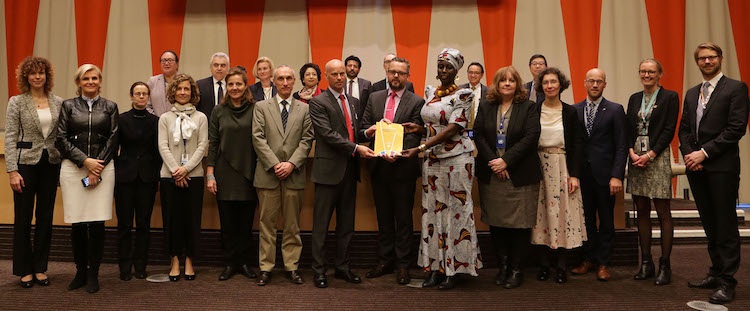Africa Renewal’s Managing Editor Kingsley Ighobor talks to Damilola Ogunbiyi NEW YORK (IDN | Africa Renewal) — Damilola Ogunbiyi is the CEO of Sustainable Energy for All (SEforALL) and the Special Representative of the UN Secretary-General for Sustainable Energy for All. On the sidelines of the UN High-Level Political Forum from July 6 to 15 […]
Renewables Are the Building Blocks of Global Energy Transition
By J W Jackie RENO, Nevada, USA (IDN) — The latest International Renewable Energy Agency IRENA analysis reveals that by 2050, variable renewables like wind and solar PV will dominate the global total power supply. The insights from IRENA’s World Energy Transitions Outlook were released on March 16-17, 2021, at the Berlin Energy Transitions Dialogue. […]
Chernobyl Anniversary Underscores the Need for Safeguards Against Nuclear Accidents
Viewpoint by Sugeeswara Senadhira The writer is Director (International Media), Presidential Secretariat, Colombo. This article was first published on April 26. It is being re-published with Mr Senadhira’s permission. COLOMBO (IDN) — Exactly 35 years ago, on April 26, 1986, the biggest nuclear accident in history took place at the Chernobyl nuclear power plant in […]
Expert Groups Prepare Roadmap for Universal Energy Access
By Radwan Jakeem NEW YORK (IDN) — The virtual launch of the High-level Dialogue on Energy 2021 Process: A Year of Energy Action on March 10 succeeded in generating a wave of enthusiastic support from key players in the energy field who committed to help drive impactful results at the September summit-level Dialogue event, according […]
Texas’ Sustainable Energy Initiatives Under Fire Amid the Latest Grid Failures
By J W Jackie RENO, Nevada, USA (IDN) — The recent energy failure in Texas left 4 million Texans without power and almost half the state under a boil water advisory. As below-freezing temperatures and an intense winter storm swept the state, the state’s energy grid—at the worse possible time. Clean energy is poised to […]
Clean Energy Set to Grow in 2021
By Marcel Alers The author is Head of Energy of the UN Development Programme (UNDP) NEW YORK (IDN) – The energy sector, still dominated by fossil fuels, is the largest contributor to greenhouse gas emissions. We know people and nations need reliable sources of energy to power hospitals and light schools, and to safely cook, […]
Urgent Action Needed to Scale-up Energy Access in LDCs
By Santo D. Banerjee NEW YORK | BEIJING (IDN) – The world’s 47 least developed countries (LDCs) will fail to achieve global sustainable energy targets by 2030 unless urgent and enhanced action is undertaken. This was the backdrop to discussions which took place on May 30-31, 2019 at a United Nations conference on ‘Scaling-Up Energy […]
Wanted Urgent Action on Energy to Achieve Global Goals
By J Nastranis NEW YORK (IDN) – About one billion people around the world live without electricity. Close to three billion lack access to clean cooking solutions and are exposed to dangerous levels of air pollution, which results in millions of deaths each year, mostly among women and children. Against this disquieting backdrop, a new […]
The World’s Poorest Need Funding for Access to Modern Energy
By Jaya Ramachandran GENEVA (IDN) – The world’s 47 least developed countries (LDCs) are “the battleground” on which the 2030 Agenda for Sustainable Development will be won or lost, Mukhisa Kituyi, Secretary-General of UNCTAD has warned, adding that it is high time for donors to meet aid commitments. The 2030 Agenda includes an explicit goal […]
Hydrogen, Iceland and the Future of Transport
By Lowana Veal
REYKJAVIK (IDN) – “Renewable hydrogen is set to outperform gasoline on a cost basis, due to substantial cost reductions for hydrogen and renewable technologies,” according to Jakob Kropsgaard of Norwegian firm NEL Hydrogen, which delivers solutions for producing, storing and distributing hydrogen from renewable energy
Speaking at a seminar here on alternative fuels for the future at the end of March, Kropsgaard said that “it is possible to produce hydrogen at a cost of 3-5 euros per kg”. When used for fuel, hydrogen is measured in kilos rather than litres.
Nevertheless, according to Valgeir Baldursson, CEO of Skeljungur oil company, “consumption of hydrogen fuel at the moment is not sufficient to produce a low price. The current cost in Europe is about 10 euros per kg.”





